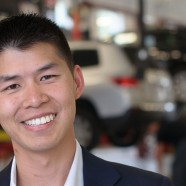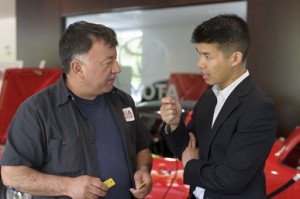
When Nai Ko ’00 joined his family’s company, he had already decided that conventional retail car sales was not going to work for him. With a degree in industrial engineering from Columbia, Nai was convinced that the business prototype could change. Fully committed to the family business his father had started in 1989, Ko Automotive Group, Nai broke new ground.
He re-imagined the sales process and ultimately earned top customer ratings among Toyota dealerships in the nation. In addition, Wellesley Toyota’s new building proclaims the company’s commitment to sustainable practices. It is the only car dealership in New England that is Leadership in Energy and Environmental Design (LEED) certified.
“Developing this building speaks to the culture of our company,” says Nai. “It’s a metaphor for how we do business. We want to manage the full spectrum of our customers’ needs—from sales, to service, to parts, to lifetime ownership. This building contributes responsibly to the full community—to the neighborhood and the environment—by using as little energy as possible.”
Achieving LEED certification translated to a 15 percent increase in construction costs. Certifying also meant choosing certain materials, sourced from particular locations; taking into account the interaction of the building and its occupants; and choosing technology that allows the building to adjust energy use. Ko Automotive also scored LEED points by using much of the existing 1950s structure. The new building’s footprint is 30 percent larger, yet is 40 percent more energy efficient than its predecessor.
“We considered the long term in developing this building,” says Nai. “By going with LEED lights and occupancy sensors, for instance, we conserve more energy, and that will help us in the future when energy becomes more expensive.
 “That decision goes hand in hand with the technology that Toyota is developing and manufacturing. Prius is the top-selling hybrid in the United States, and Toyota anticipates that eventually all its vehicles will be hybrids. Our customers care about being on the forefront of technology, and being environmentally responsible.”
“That decision goes hand in hand with the technology that Toyota is developing and manufacturing. Prius is the top-selling hybrid in the United States, and Toyota anticipates that eventually all its vehicles will be hybrids. Our customers care about being on the forefront of technology, and being environmentally responsible.”
Nai is the general manager of Ko Automotive Group and his father, Nai Nan Ko, Sr., is president. Nai Senior was a mechanical engineer in Taiwan and moved to the United States in the 1960s, with $200 and no English skills, to study aeronautical engineering on a scholarship at Boston University. A full-time student, he took a job as a mechanic to support himself and his future wife. Balancing school and work became too much, so he left BU and purchased a gas station on Memorial Drive in Cambridge. His business break came in 1986 when he partnered to buy his first automotive franchise—Cambridge Nissan in Inman Square. His business has since grown to include six dealerships.
Being part of a family business is stressful and demands long hours. “Ultimately,” Nai says, “I wanted to be with my family. When I was growing up, my dad worked all the time. I never had a relationship with him. What better way to meet and know my father than to become his business partner?”
Language barriers meant that Nai’s parents couldn’t help their children navigate logistics like soccer sign-ups or skiing lessons. Nai learned to manage extracurriculars on his own. He remembers struggling with English class and the SATs.
“Grit is a family characteristic,” says Nai. “We often have to work twice as hard for the same result. That’s fine with us. I’m grateful for many things my father taught me—his work ethic, his kindness, the honest way he does business. My family ingrained these fundamentals in me.”
Separating personal and business relationships is challenging for families in business together. Nai struggled to understand his father’s conservative approach; his father was slow to adopt new ideas.
“Over time, you see the success of one another’s styles and learn how to merge the best of both. But that happens only after many, many arguments. Everyone puts so much heart into what they do. Equally challenging is that people outside the family often make judgments about who you are and why you’re here. So, you have to lead by example. You have to work harder.”
Wellesley Toyota does work harder to earn a loyal customer. “During the conventional sales process, an overwhelming, high-pressure salesperson confronts the customer,” says Nai. “That salesperson relies on commissions and is trying to close the next deal, so he or she spends less time explaining features and trying to understand a customer’s lifestyle requirements. Compounding the pressure is the thin profit margin in new-car sales. People know what we pay for these cars, so they’re savvy negotiators. This traditional formula is bound to fail.”
Nai’s sales model, like Apple’s Genius structure, relies on product specialists, who are paid hourly and who encourage you to spend as much time as you like test driving different cars, ask about your needs and hopes, and help you become thoroughly informed. When you decide on a vehicle, you move on to an engagement specialist, who works with you, one-on-one, through the process from trade appraisal to price negotiation, from finance needs to purchase protections. When you come to pick up your new car, you meet again with a product specialist, who takes time to walk you through your car’s many (increasingly technological and complicated) features.
“The industry can’t draw young talent right now,” says Nai. “Our generation doesn’t want to be commission-based. This sales process enables us to draw younger talent.” Nai, at 31 years old, has the youngest staff in the car industry: his managers are 26 and 27; his marketing director is 22; and many of his product specialists are still in college.
MIT professors have approached Nai, wanting to learn about the innovative process. BMW just rolled out a similar program, based on Nai’s model, called BMW Genius.
“The buying process should be educational and low-pressure,” Nai says. “The best type of pressure to solidify a sale is self-pressure. The customer should want to do business with us.”
In 2008, under Nai’s management, Wellesley Toyota won the company’s prestigious President’s Award, honoring exceptional customer satisfaction and sales service metrics. “Winning the President’s Award prompted me to give back somehow,” says Nai. He established the Ko Family Speaker Fund where he attended elementary school, Belmont Day School. “I’m concerned about risks to the moral and ethical education of our children,” he says. The series focuses on topics like raising children in a culture of affluence, the effect media have on young people, preventing bullying, and the importance of grit.”
–Erin Berg



